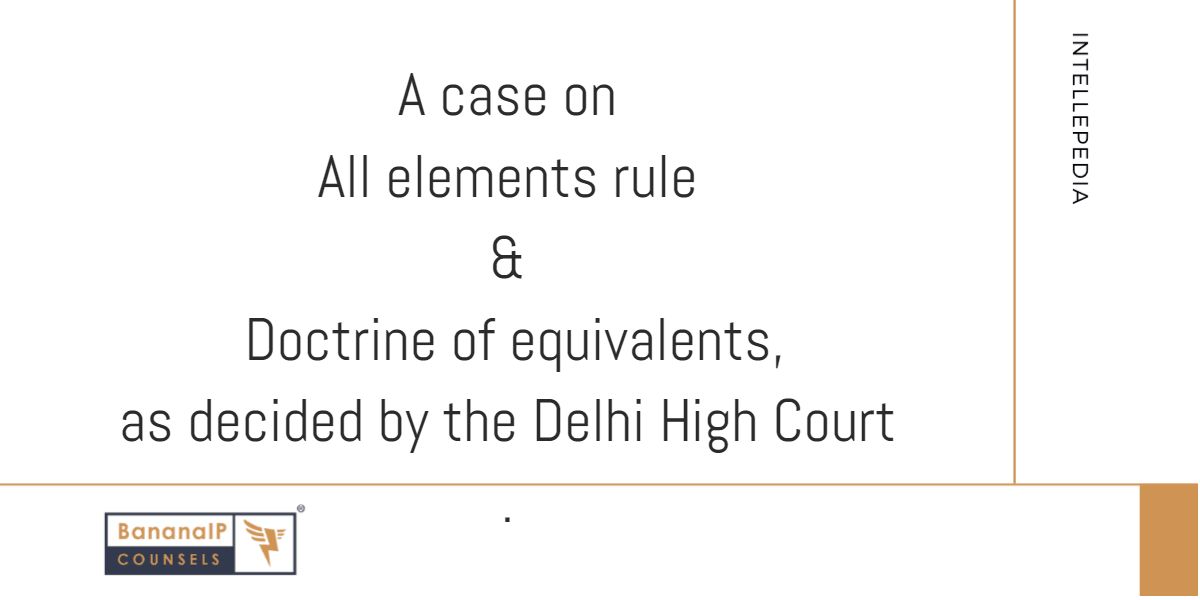The Delhi High Court in a recent patent infringement dispute, held that ‘all-elements rule’ cannot be adopted to the exclusion of the ‘pith and marrow rule’.
Facts:
SNPC Machines (Plaintiff) sought a permanent injunction against Mr. Vishal Choudhary (Defendant) for manufacturing and selling brick-making machines which were similar to plaintiffs’ brick-making machines granted under patent nos. 353483, 359114, 374814, and 385845. Further, relief was also sought by the plaintiff for infringement of copyright in literature/ specification/ artistic features related to the plaintiff’s brick-making machine. The Delhi High Court found that the plaintiff had established a prima facie case of infringement and granted an interim injunction in favor of the plaintiffs.
Submissions:
It was submitted by the plaintiff that the defendant’s machine sold under the name of Padma Brick Making Machine was a mobile brick-making machine having substantially the same features as that of the plaintiff’s machine except that the brick-making assembly of the defendant was pulled by a tractor as opposed to having an integrated driver’s cabin in the Plaintiff’s machine. The plaintiff also stated that a Cease-and-Desist letter was issued to the defendant when the plaintiff had come across a brochure posted by the defendant relating to the brick-making machine of the defendant. However, no response was received to the Cease and Desist letter. The plaintiff also provided a table mapping the granted claims of the plaintiff’s patent with the defendant’s impugned brick-making machine. Based on purposive construction and Doctrine of equivalents, it was contented by the plaintiff that the differential aspects claimed by the defendant were insignificant.
Court’s Observation:
The court stated that one may not practice a fraud on the patent and an infringer should not be able to get away by merely arguing that some elements of the plaintiff’s products are not present in that of the defendant. In order to establish a possible infringement, the pith and marrow test is to be used alongside the triple identity test. Further, based on the analysis of various precedents cited by the plaintiffs and defendant such as Sotefin SA v. Indraprastha Cancer Society & Research Center & Ors., FMC Corporation &Ors. V. Natco Pharma Ltd., and Rxprism Health Systems Private Limited and another v Canva Pty Limited and Ors., the court laid down various aspects that are to be considered for potentially infringing patent claims such as:
“a) Claims have to be construed in a particular manner and not merely literal;
b) Trivial variations may not itself be relevant;
c) Assessment has to be made whether alleged infringing product is producing the same equivalent effect as that of suit patent;
d) A product versus product comparison cannot be determinative of infringement but of claims versus product comparison;
e) The pith and marrow of invention is to be looked at;
f) Detailed specification and analysis may not be necessary;
g) It has to be seen whether the infringing product does the same work, in substantially the same way, to accomplish substantially the same result.”
Further, using the triple test of ‘Function-Way-Result’, the court also observed that the substituted element in the infringing product performed substantially the same function in substantially the same way to achieve substantially the same result.
Conclusion:
In view of the aforementioned and a detailed analysis of the issue of territorial jurisdiction, and estoppel, the Court found that the plaintiff had made out a prima facie case in their favor and would suffer irreparable injury if no injunction was issued. Accordingly, an interim injunction was granted in favor of the plaintiff and the defendants were restrained from using, making, manufacturing, offering for sale or selling, or importing the impugned brick-making machine infringing the plaintiffs’ patent nos., 353483, 359114, 374814, 385845 and/or any product similar thereto without consent, permission, or authorized license from plaintiffs. The defendants and their representatives were also restrained from infringing plaintiffs’ copyright in literature/ detail/ specification/ artistic features/ information/ get-up/ layout/ arrangement or any other literature or specification.
Citation: SNPC Machines Private Limited & Ors. vs. Mr. Vishal Choudhary, Delhi High Court, 05th March, 2024, I.A. 11490/2023 in CS(COMM) 431/2023.
Authored by Anjali S, Patents Team, BananaIP Counsels
Disclaimer
The case note/s in this blog post have been written by IP Attorneys at BananaIP Counsels based on their review and understanding of the Judgments. It may be noted that other IP attorneys and experts in the field may have different opinions about the cases or arrive at different conclusions therefrom. It is advisable to read the Judgments before making any decisions based on the case notes.
If you have any questions, or if you wish to speak with an IP expert/attorney, please reach us at: contact@bananaip.com or 91-80-26860414/24/34.



